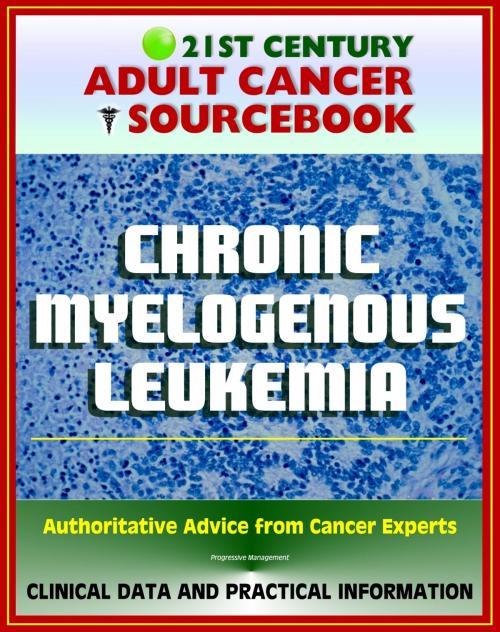21st Century Adult Cancer Sourcebook: Chronic Myelogenous Leukemia (CML) - Clinical Data for Patients, Families, and Physicians
Nonfiction, Health & Well Being, Health, Ailments & Diseases, Cancer, Medical| Author: | Progressive Management | ISBN: | 9781465990242 |
| Publisher: | Progressive Management | Publication: | October 4, 2011 |
| Imprint: | Smashwords Edition | Language: | English |
| Author: | Progressive Management |
| ISBN: | 9781465990242 |
| Publisher: | Progressive Management |
| Publication: | October 4, 2011 |
| Imprint: | Smashwords Edition |
| Language: | English |
Authoritative information and practical advice from the nation's cancer experts about chronic myelogenous leukemia (CML) includes official medical data on signs, symptoms, early detection, diagnostic testing, risk factors and prevention, treatment options, surgery, radiation, drugs, chemotherapy, staging, biology, prognosis, and survival, with a complete glossary of technical medical terms and current references. Starting with the basics, and advancing to detailed patient-oriented and physician-quality information, this comprehensive in-depth compilation gives empowered patients, families, caregivers, nurses, and physicians the knowledge they need to understand the diagnosis and treatment of CML.
Comprehensive data on clinical trials related to CML is included - - with information on intervention, sponsor, gender, age group, trial phase, number of enrolled patients, funding source, study type, study design, NCT identification number and other IDs, first received date, start date, completion date, primary completion date, last updated date, last verified date, associated acronym, and outcome measures.
Chronic myelogenous leukemia is a disease in which the bone marrow makes too many white blood cells. Chronic myelogenous leukemia (also called CML or chronic granulocytic leukemia) is a slowly progressing blood and bone marrow disease that usually occurs during or after middle age, and rarely occurs in children. Normally, the bone marrow makes blood stem cells (immature cells) that develop into mature blood cells over time. A blood stem cell may become a myeloid stem cell or a lymphoid stem cell. The lymphoid stem cell develops into a white blood cell. The myeloid stem cell develops into one of three types of mature blood cells: Red blood cells that carry oxygen and other materials to all tissues of the body. Platelets that help prevent bleeding by causing blood clots to form. Granulocytes (white blood cells) that fight infection and disease. In CML, too many blood stem cells develop into a type of white blood cell called granulocytes. These granulocytes are abnormal and do not become healthy white blood cells. They may also be called leukemic cells. The leukemic cells can build up in the blood and bone marrow so there is less room for healthy white blood cells, red blood cells, and platelets. When this happens, infection, anemia, or easy bleeding may occur. Possible signs of chronic myelogenous leukemia include tiredness, night sweats, and fever.
At the time of diagnosis of patients with CML, splenomegaly is the most common finding on physical examination. The spleen may be enormous, filling most of the abdomen and presenting a significant clinical problem, or the spleen may be only minimally enlarged. In about 10% of patients, the spleen is neither palpable nor enlarged on splenic scan.
Extensive supplements, with chapters gathered from our Cancer Toolkit series and other reports, cover a broad range of cancer topics useful to cancer patients. This edition includes our exclusive Guide to Leading Medical Websites with updated links to 81 of the best sites for medical information, which let you quickly check for updates from the government and the best commercial portals, news sites, reference/textbook/non-commercial portals, and health organizations. Supplemental coverage includes:
Levels of Evidence for Cancer Treatment Studies
Glossary of Clinical Trial Terms
Clinical Trials Background Information and In-Depth Program
Clinical Trials at NIH
How To Find A Cancer Treatment Trial: A Ten-Step Guide
Taking Part in Cancer Treatment Research Studies
Access to Investigational Drugs
Clinical Trials Conducted by the National Cancer Institute's Center for Cancer Research at the National Institutes of Health Clinical Center
Taking Time: Support for People with Cancer
Facing Forward - Life After Cancer Treatment
Chemotherapy and You
Authoritative information and practical advice from the nation's cancer experts about chronic myelogenous leukemia (CML) includes official medical data on signs, symptoms, early detection, diagnostic testing, risk factors and prevention, treatment options, surgery, radiation, drugs, chemotherapy, staging, biology, prognosis, and survival, with a complete glossary of technical medical terms and current references. Starting with the basics, and advancing to detailed patient-oriented and physician-quality information, this comprehensive in-depth compilation gives empowered patients, families, caregivers, nurses, and physicians the knowledge they need to understand the diagnosis and treatment of CML.
Comprehensive data on clinical trials related to CML is included - - with information on intervention, sponsor, gender, age group, trial phase, number of enrolled patients, funding source, study type, study design, NCT identification number and other IDs, first received date, start date, completion date, primary completion date, last updated date, last verified date, associated acronym, and outcome measures.
Chronic myelogenous leukemia is a disease in which the bone marrow makes too many white blood cells. Chronic myelogenous leukemia (also called CML or chronic granulocytic leukemia) is a slowly progressing blood and bone marrow disease that usually occurs during or after middle age, and rarely occurs in children. Normally, the bone marrow makes blood stem cells (immature cells) that develop into mature blood cells over time. A blood stem cell may become a myeloid stem cell or a lymphoid stem cell. The lymphoid stem cell develops into a white blood cell. The myeloid stem cell develops into one of three types of mature blood cells: Red blood cells that carry oxygen and other materials to all tissues of the body. Platelets that help prevent bleeding by causing blood clots to form. Granulocytes (white blood cells) that fight infection and disease. In CML, too many blood stem cells develop into a type of white blood cell called granulocytes. These granulocytes are abnormal and do not become healthy white blood cells. They may also be called leukemic cells. The leukemic cells can build up in the blood and bone marrow so there is less room for healthy white blood cells, red blood cells, and platelets. When this happens, infection, anemia, or easy bleeding may occur. Possible signs of chronic myelogenous leukemia include tiredness, night sweats, and fever.
At the time of diagnosis of patients with CML, splenomegaly is the most common finding on physical examination. The spleen may be enormous, filling most of the abdomen and presenting a significant clinical problem, or the spleen may be only minimally enlarged. In about 10% of patients, the spleen is neither palpable nor enlarged on splenic scan.
Extensive supplements, with chapters gathered from our Cancer Toolkit series and other reports, cover a broad range of cancer topics useful to cancer patients. This edition includes our exclusive Guide to Leading Medical Websites with updated links to 81 of the best sites for medical information, which let you quickly check for updates from the government and the best commercial portals, news sites, reference/textbook/non-commercial portals, and health organizations. Supplemental coverage includes:
Levels of Evidence for Cancer Treatment Studies
Glossary of Clinical Trial Terms
Clinical Trials Background Information and In-Depth Program
Clinical Trials at NIH
How To Find A Cancer Treatment Trial: A Ten-Step Guide
Taking Part in Cancer Treatment Research Studies
Access to Investigational Drugs
Clinical Trials Conducted by the National Cancer Institute's Center for Cancer Research at the National Institutes of Health Clinical Center
Taking Time: Support for People with Cancer
Facing Forward - Life After Cancer Treatment
Chemotherapy and You















